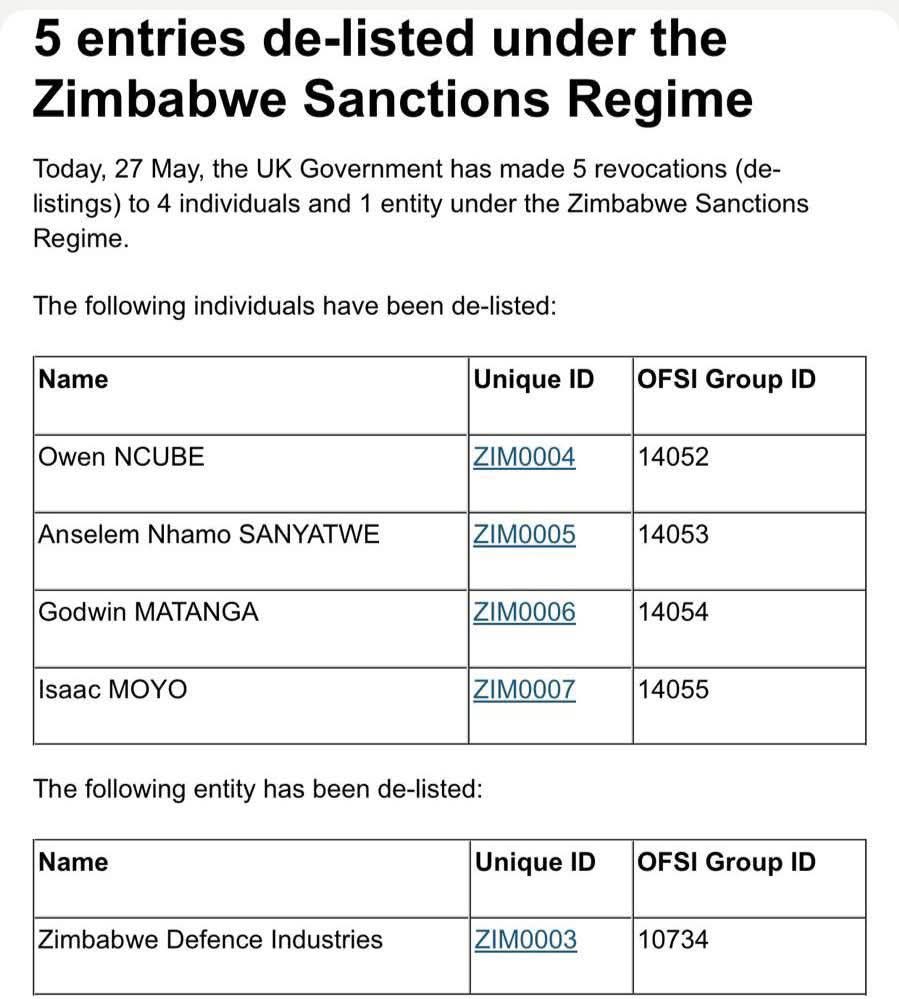Mnangagwa re-engagement drive pays off as UK lifts sanctions

By Staff Reporter
LONDON – The United Kingdom has lifted sanctions on four top Zimbabwean security officials and the state-owned arms manufacturer, Zimbabwe Defence Industries (ZDI), in a significant diplomatic shift that mirrors recent moves by the European Union and the United States.
The individuals removed from the UK’s sanctions list are Owen “Mudha” Ncube, former State Security Minister; Isaac Moyo, Director-General of the Central Intelligence Organisation (CIO); Police Commissioner-General Godwin Matanga; and former Presidential Guard commander Anselem Sanyatwe, now Sports Minister having previously served as Zimbabwe’s ambassador to Tanzania. All four were placed under restrictive measures by the UK in 2021 over their alleged roles in state violence during and after Zimbabwe’s disputed 2018 elections and the brutal suppression of nationwide protests in January 2019.
ZDI, a key player in Zimbabwe’s military-industrial complex, was also delisted as part of the UK’s revocations. The firm had been sanctioned over concerns about its links to human rights abuses and its role in equipping security forces accused of internal repression.
The UK’s Foreign, Commonwealth and Development Office (FCDO) stated the decision reflects a broader recalibration of Western policy on Zimbabwe. “The revocations follow a similar move from the European Union in February 2025, when they delisted their last remaining entity, Zimbabwe Defence Industries, while maintaining their broader sanctions framework. The United States also removed a number of Zimbabwean designations in March 2024,” the statement said.
The latest move is likely to be welcomed by President Emmerson Mnangagwa’s administration, which has long argued that sanctions are unjustified and politically motivated. However, critics of the government and human rights organisations are expected to express concern over the delisting, citing a lack of accountability for past abuses and a continued culture of impunity within Zimbabwe’s security establishment.

The original UK sanctions had been part of coordinated international pressure following the military-assisted transition that ousted long-time ruler Robert Mugabe in 2017. Hopes for democratic reform under Mnangagwa quickly faded after security forces fatally shot civilians protesting delayed election results on 1 August 2018, and again during the January 2019 fuel price hike protests, during which dozens were killed or injured and hundreds arrested.
The four officials sanctioned in 2021 were accused of directing or overseeing those crackdowns.
In a separate action in the same year, the UK also slapped sanctions on businessman Kudakwashe Tagwirei, a close Mnangagwa ally, accusing him of “profiting from misappropriation of property” through his company Sakunda Holdings’ involvement in the controversial Command Agriculture programme. Tagwirei remains on the UK’s sanctions list.
While the removal of sanctions on the security chiefs may be seen as a gesture toward re-engagement, analysts caution that it should not be interpreted as a clean bill of health for Zimbabwe’s governance record.
“These developments signal a shift in how the West is managing its relationship with Harare — perhaps from isolation to cautious engagement,” said one diplomatic source. “But this doesn’t mean human rights concerns have vanished.”
For now, the sanctions framework remains in place, and the UK says it “retains the ability to reimpose targeted measures should the human rights situation deteriorate again.”
With elections expected in the coming years and Zimbabwe’s political climate still tense, many observers will be watching closely to see whether this diplomatic thaw brings real reform — or simply a return to business as usual.









